
Belgian postcard by G.D.E. (G. Dupont-Emera), Rue Royale 142, Bruxelles.

French postcard for Campari. Photo: Studio G.L. Manuel Frères. Caption: "Ma concierge ne sait pas où je suis... je bois du Campari à Paris, à l'étranger, au cercle. Je n'ai plus un moment pour rentrer chez moi."

French postcard by Editions O.P., Paris, no. 103. Photo: Star.
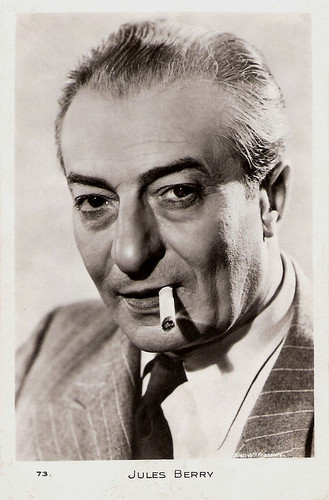
French postcard by Ed. Chantal, Paris, no. 73.
Front rank comedic actor
Jules Berry was born Marie Louis Jules Paufichet in Poitiers, France, in 1883. He had two brothers. His parents moved to Paris where he studied architecture at l'École des Beaux-Arts, but he soon discovered an attraction to the theatre.
His first job was as an apprentice at the Théâtre Antoine in 1903. Later he appeared at the stages of the Ambigu and the Théâtre de l'Athénée. In 1907 he had his first big success in George Feydeau's comedy 'La Duchesse des Folies-Bergères' in Lyon.
The following year he was engaged by the Théâtre des Galeries Saint-Hubert in Brussels, where he would stay for twelve years. After the First World War, Berry returned to Paris and appeared in a series of vaudevilles and light comedies. These were not particularly challenging but they did give him the opportunity to play a great variety of parts and to refine his talent.
In the following decade, he established a reputation as a front-rank comedic actor. In his private life, Jules Berry was a ladies man and a gambler (he gambled away much of what he earned in his life).
Something of that aura of the dandy pervaded his performances: he became noted for his elegant appearance, vivid temperament, timing, and his ease at portraying both lovers and seducers — roles he was to be equally adept at playing in films.

Belgian postcard. Photo: G. Dupont-Emera (GDE). Jules Berry as André and Jane Delmar as Claire in the play 'La Demoiselle du magasin' (The shop girl), a 1913 theatrical play in three acts written by Belgians Frantz Fonson and Fernand Wicheler, who had already had a big success with their play 'Le marriage de Mlle Beulemans' (1910). The play 'La Demoiselle du magasin' was first performed in Paris at the Théâtre du Gymnase, from 13 February 1913. From 12 October of the same year, it was shown at the Théâtre des Galeries Saint-Hubert in Brussels - to which this card refers. For Delmar, the play meant her claim of fame. After months of performances in Paris, the success was repeated in Brussels. In 1915 the play was staged again in Paris, but this time without Berry. In 1921 there were plans to stage it once more, now again with Berry.
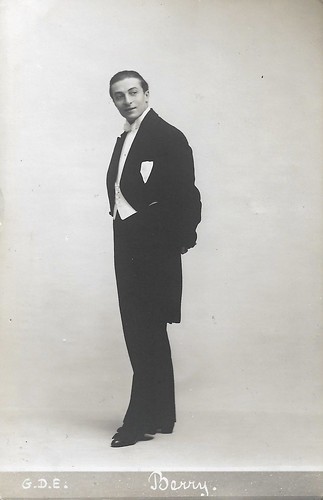
French postcard by G.D.E. (G. Dupont-Emera).

French postcard by G.D.E. (G. Dupont-Emera).
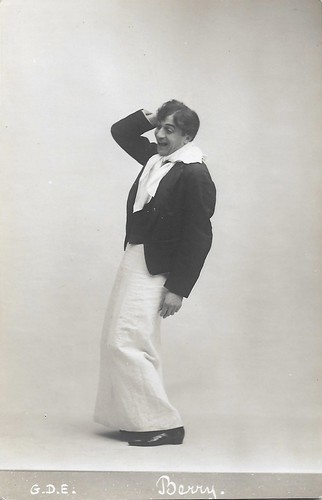
Belgian postcard by G.D.E. (G. Dupont-Emera). At the start of his stage career, actor Jules Berry played for twelve years at the Galeries Saint-Hubert theatre in Brussels. The Brussels public gave him a very warm welcome. He played in particular in the comedy 'Le Mariage de Mademoiselle Beulemans', which had its premiere in 1910 at the Théâtre de l'Olympia in Brussels, and became a big success in Belgium and abroad, and was also turned into an operetta (1912) and film adaptations (1927, 1932, 1950). Berry's outfit in this card may well refer to this popular play. He played Albert, a Parisian employee of the brewer Beulemans, and this not only in Brussels but also in the Paris and London performances of the play.
Films d'art
Jules Berry already made his first film appearances in the days of the early silent cinema. He appeared in such short films as Tirez s'il vous plait/Shoot Please (Louis Gasnier, 1908), and the ‘Films d'art’ productions Shylock (Henri Desfontaines, 1910) and Olivier Cromwell (Henri Desfontaines, 1911).
In the following four decades he would appear in nearly 100 films. According to Karel Tabery at Filmreference, Berry made his first important film appearance in L'Argent/The Money (Marcel L’Herbier, 1928) starring Brigitte Helm, an adaptation of the work by Emile Zola.
His first speaking role was in Mon coeur et ses millions/My Love and Her Millions (André Berthomieu, 1930) at the side of Suzy Prim. In the early 1930s, like many of his fellow stage actors, he made films abroad and worked in film studios in Stockholm, Budapest, and Berlin, where he appeared in the French language version of Quick (André Daven, Robert Siodmak, 1932) with Lilian Harvey.
After returning to Paris he got a part in Arlette et ses papas/Arlette and her papas (Henry Roussel, 1934), returned briefly to the stage, and then left the theatre entirely for a time. He accepted any film offers that came his way without much concern for the quality of the script or the director.
His reputation in the theatre often served as a guarantee for many adaptations on plays, talky efforts that had little to do with the expressionistic techniques available to film. These unpretentious productions were popular with French audiences of the early 1930s.

French postcard by Editions P.C., Paris, no. 128. Photo: Jacques Haïk.
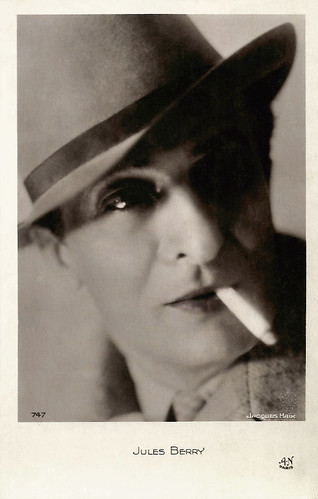
French postcard by Editions A.N., Paris, no. 747. Photo: Jacques Haïk.

French postcard by Editions P.I., Paris, no. 118, presented by Les Carbones Korès. Photo: Star.

Belgian postcard by Editions Thièry B.F., Bruxelles, no. 1008. Photo: Star, Paris.
Cynical Don Juan
From 1933 until his death in 1951 Jules Berry appeared in as many as 10 films a year. Berry was the ideal representative of the usual hero — high society sophisticate, aristocrat, successful industrialist, cynical Don Juan.
He played yet another variant on his usual range of characters in Le Crime de Monsieur Lange/The Crime of Monsieur Lange (Jean Renoir, 1935), but this was a film written by Jacques Prévert and directed by Jean Renoir, and here Berry achieved greater conciseness and dramatic tension in his performance than in his other films. Karel Tabery at Film Reference states that as the entrepreneur Batala, whose interests are dictated by his egoism, and who not only mercilessly exploits his employees but also tries to dupe them, Berry gave a performance that was universally admired.
A more benign Jules Berry was seen as the title character in Arsene Lupin Detective/Arsene Lupin, Detective (Henri Diamant-Berger, 1937).
Another great film Tabery mentions is Le Jour se lève/Daybreak (Marcel Carné, 1939) with a script by Jacques Prévert. Berry played a sadistic nightclub owner who obstructs the love of two young people. Berry gives a masterful performance of rich nuance, expressing a series of contradictory states of mind: a charlatan who sneers at human goodness and weakness, abuses his power, dissimulates, torments others with his cruelty, then tries to evoke pity for himself.
In 1940 Jules Berry made his last stage appearance, in Paris.
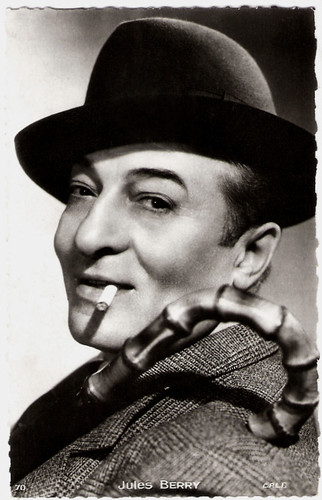
French postcard, no. 70. Photo: C.P.L.F.

French postcard by Editions P.I., Paris, no. 65.

Belgian collectors card by Nels Bromurite for Kwatta. Photo: Filmsonor.
A bureaucratic Satan
Jules Berry created a bureaucratic Satan in Les Visiteurs du soir/The Devil's Envoy (Marcel Carné, 1942). The film was highly praised, and it marks a high point in Berry's career as a film actor.
In the following years, he made unpretentious detective films and played yet another unsympathetic character in the Georges Siménon mystery Le Voyageur de la Toussain/The Traveller of Toussain (Louis Daquin, 1943).
But Berry was not really offered the opportunities in the 1940s that his talent and reputation should have commanded. An exception is the brilliant comedy Si jeunesse savait/If Youth Only Knew (André Cerf, 1948). Berry plays a billionaire and shows the exceptional range, technique, and mature interpretational style he had developed.
He finished his film career in 1951 to interpret the texts of Jacques Prévert.
Jules Berry died of a heart attack in Paris in 1951. He was 68. Berry was married to the actresses Jane Marken, Suzy Prim, and Josseline Gaël. With the latter, he had a daughter, Michèle.
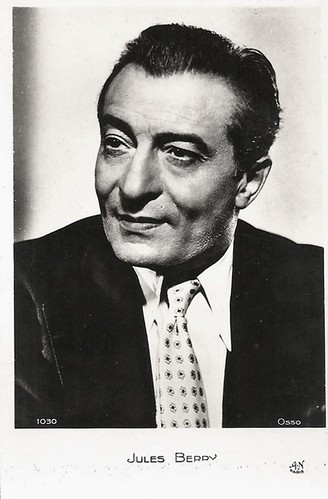
French postcard by A.N., Paris, no. 1030. Photo: Les Films Osso, Paris.

French collectors card by Massilia.
Trailer for Le Crime de Monsieur Lange/The Crime of Mr. Lange (Jean Renoir, 1935). Source: Rialto Pictures (YouTube).
Jules Berry and Noël-Noël in the comedy La Famille Duraton/The Duraton Family (Christian Stengel, 1939). Source: Robaggio10 (YouTube).
Sources: Karel Tabery (Filmreference.com), Wikipedia (French), Hal Erickson (AllMovie), and IMDb.
This post was last updated on 21 June 2021.
It's really amusing to think of somebody named Apollonie Paris changing her name to Suzy Vernon.It's easier to imagine it the other way around. Fascinating information. It must take you a lot of time and work to put this all together. Very nicely done as always.
ReplyDelete